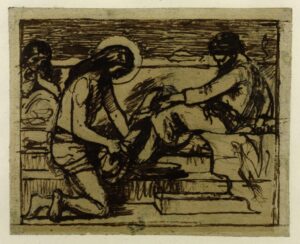
*This is part of our Why We Do What We Do series at Faith Bible Church. At FBC, we have elders and deacons who work together to equip and serve the church. We begin to examine the functions, roles, and characteristics of elders and deacons in this short series.
Last time, we considered the two biblical offices of Elders and Deacons, and today, we’ll briefly explore the primary roles of each office given to equip and serve the church.
ROLE OF AN ELDER
Elders were not above “serving tables” (Acts 6:1-4), but other roles needed to be filled, to which they had been called. So, what is the role of an elder? Alexander Strauch well summarizes this in his book Biblical Eldership:
“Elders lead the church [1 Tim 5:17; Titus 1:7; 1 Peter 5:1–2], teach and preach the Word [1 Timothy 3:2; 2 Timothy 4:2; Titus 1:9], protect the church from false teachers [Acts 20:17, 28–31], exhort and admonish the saints in sound doctrine [1 Timothy 4:13; 2 Timothy 3:13–17; Titus 1:9], visit the sick and pray [James 5:14; Acts 6:4], and judge doctrinal issues [Acts 15:6]. In biblical terminology, elders shepherd, oversee, lead, and care for the local church”.
Scripture employs three terms to describe this office: elder, overseer, and pastor. The term “pastor” is used only once in Ephesians 4:11, where it is synonymous with “teaching,” a function typically associated with elders. The word ‘pastor’ comes from the same Greek word as ‘shepherd.’ An elder is not only to teach the Word but to care for God’s people as a shepherd for his flock (Acts 20:28, 1 Peter 5:1-2, Titus 1:9). To pastor is something an elder does.
Likewise, “overseer” is another term that is often confused with a distinct role from that of an elder. However, we see in Paul’s writing to the Ephesian elders that he calls them overseers (Acts 20:17-35). Titus 1:7 also uses these two words interchangeably. Overseer is used to describe the function of elders, much like pastor or shepherd, rather than a title per se. To oversee is something an elder does.
Here are some specific examples of the role of FBC elders:
- Participate in discerning the mind and will of Jesus Christ in the overall direction of the mission He has given FBC to fulfill.
- Attend monthly elder meetings prepared to participate in a meaningful way.
- Leading in a Missional Community.
- Participate in a specific ministry at FBC, living life-on-life with flock members and providing spiritual care.
- Provide loving discipline for flock members.
- Preaching for Sunday gatherings and leading the church in the observance of communion.
- Visiting the sick, injured, and dying to pray for them
- Continuing to develop and nurture a life of prayer, worship, and study of Scripture.
- Provide teaching of sound doctrine and rebuking false teachings.
ROLE OF A DEACON
Let’s refer back to the selection of men in Acts 6. Serving widows may seem like a menial task, but notice the care and devotion the Apostles use in the selection process. These were men who had a good standing with the people, who were filled with the Spirit, and who exercised great wisdom. This kind of attention to detail is what separates a deacon from a volunteer. Volunteers are highly valued servants of the church, but deacons go far above the call of duty in their ownership and responsibility of the ministry.
Deacons serve as pastoral assistants to whom the pastors and elders can entrust various components of the ministry, knowing that the deacons will do as good a job caring for the needs of the community of believers. As a result, the elders can then devote themselves to prayer and the ministry of the Word.
Here are some specific examples of the role of FBC deacons:
- Leading in a Missional Community.
- Directing particular areas of ministry.
- Serving in non-pastoral staff roles (administrator, assistant, intern, etc.).
- Administering material help to those in need (benevolence).
- Leading in ministries of intercession and prayer.
- Counseling.
- Planning and/or leading order of worship.
- Setting up and tearing down for worship gatherings.
- Planning retreats, conferences, and events.
- Organizing events to serve or care for the city.
WHY ARE BOTH ELDERS AND DEACONS NEEDED?
“And the word of God continued to increase, and the number of the disciples multiplied greatly in Jerusalem, and a great many of the priests became obedient to the faith” (Acts 6:7).
It’s no coincidence this verse immediately follows the choosing of the seven men to serve. The result of appointing deacons is the freeing up of both offices to serve in their unique roles, which in turn fosters the flourishing of the church.
Holistic Care for the Body
God is not merely an ethereal being concerned only with “spiritual” things, apart from the physical. He is a physically real God who created a physical people to dwell on a physical planet within a physical universe. He cares holistically for His people. This is best exemplified in Jesus, who took on physical flesh and died a physical death to restore our relationship with God. While Jesus walked this earth, he preached the kingdom of God, preached good news, and met people’s physical needs. He often fed people before teaching them, healed their bodies before healing their hearts, and came to their rescue before telling them to go and sin no more. As people called to reflect Christ and to serve the church as he has, we must consider holistic care of mind, body, and spirit. This is best carried out in the Scriptural example of elders and deacons.
Complimentary Roles
Scripture often discusses the various gifts, skills, and roles that are used together for a single, common purpose. This can be seen in Paul’s description of marriage roles (Ephesians 5; 1 Corinthians 11; Colossians 3), as well as instructions for the entire body of the church (1 Corinthians 12). These roles are distinctive and unique but complementary. Though in marriage, the man is called to lead the woman, both roles are equally important and valued in the kingdom. Though elders are called to lead over deacons, both roles are equally vital to the church. When these roles work together, the whole body grows stronger.
In Part Three, we’ll examine the biblical characteristics of elders and deacons and discuss who can serve in these offices within the church.
